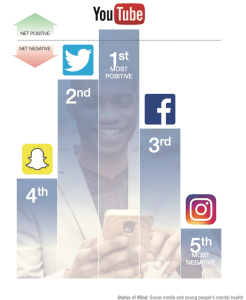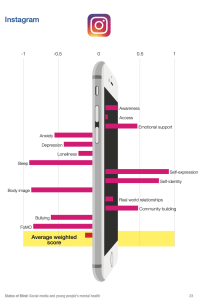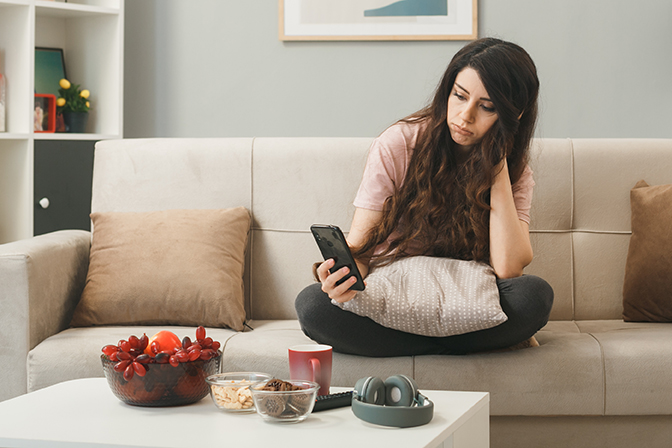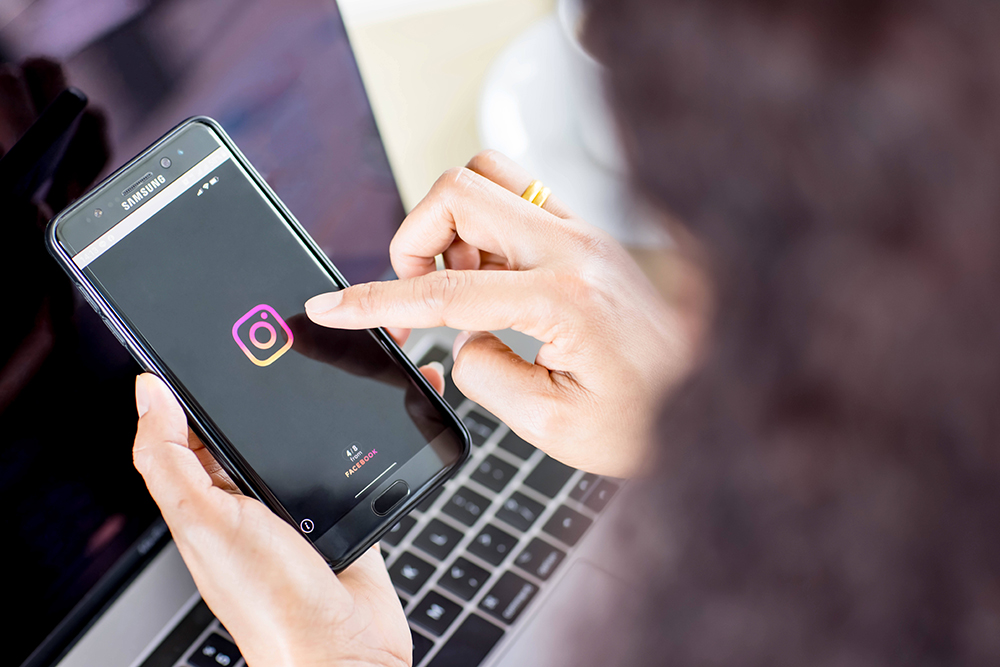- Social networks provide access to other people’s experiences that can aid us in a multitude of educational, training, health, cooking, household, travel related tasks.
- They provide emotional support and allow for the emergence of an extended community that strengthens our social support.
- They’re an extraordinary channel to externalise our personalities, emotionals, and thoughts… and to create, maintain and strengthen personal relationships.
 However, there are other factors in which social networks and mental health go hand in hand that we collectively should take into account.
However, there are other factors in which social networks and mental health go hand in hand that we collectively should take into account.In May 2017 the Royal Society for Public Health and the Young Health Movement published a very revealing study called “Status of Mind” on the impact social networks have on the mental health of young people and the conclusions were devastating, rating Instagram as the worst social network for the mental health of young people for causing anxiety, depression and lack of sleep, with YouTube ranking first in terms of the social network that brings the most benefits to its users.
Negative aspects: What occurs on Instagram?
Instagram allows its users to present a style of life different from their own by making the depicted reality look like someone else’s. When exploring the different posts they will always find people with a life supposedly better than theirs, a bigger and more luxurious house, a cooler car, a cuter boyfriend, an amazing body, places that they’ll never be able to visit… and this has consequences that are quite evident for the mental health of their users in which it provokes a constant frustration because they aspire to something as unreal as unattainable: no matter how much effort they put to get to that place, they will never get there and every time they enter this platform they are made aware of this, increasing their feeling of unhappiness and dissatisfaction with their own reality.
 The negative consequences of social networks on mental health not only affects consumers, but also the influencers themselves, whose image becomes a product subject to constant scrutiny from users from which they seek continual approval and, in this process, also receive a negative impact on their psychological health. According to this study conducted with a sample of nearly 1,500 people aged 14 to 24 years:
The negative consequences of social networks on mental health not only affects consumers, but also the influencers themselves, whose image becomes a product subject to constant scrutiny from users from which they seek continual approval and, in this process, also receive a negative impact on their psychological health. According to this study conducted with a sample of nearly 1,500 people aged 14 to 24 years:- In the U.K the rate of anxiety and depression has increased by 70% in 25 years.
- 1 in 2 people confirms it boosts feelings of anxiety.
- 9 out of 10 girls say it makes them feel worse with their own body.
And on Facebook?
Facebook, which owns Instagram, has been conducting internal studies since 2019 to evaluate the impact their platforms have in your peoples health and their conclusions published in September 2021 by the Wall Street Journal corroborate those of the previous study by the Royal Society for Public Health, confirming that the app produces a “negative social comparison” and that “approximately about 32% of women that use it feel worse about their bodies”. More than 40% of young women who viewed themselves as unattractive started to feel that way on Instagram.
In one of the documents, one of the researchers explains that “they feel addicted and know that what they see is bad for their mental health, but are unable to stop”. The worst part about this case is that Facebook publicly denies the negative impact on the health of young people and has not implemented any solution to this pressing social problem.
Our role as parents
Today’s parents face the most perplexing challenge in our history. In our childhood and adolescence the way we interacted was purely physical, however, now our children have digital platforms for social interaction that we have accessed in our maturity, so we do not know how to manage them properly.
Fortunately, these studies shed some light on the real impact that these platforms will have on the mental health of our children and can help them to manage them better, before the platforms manage them.








